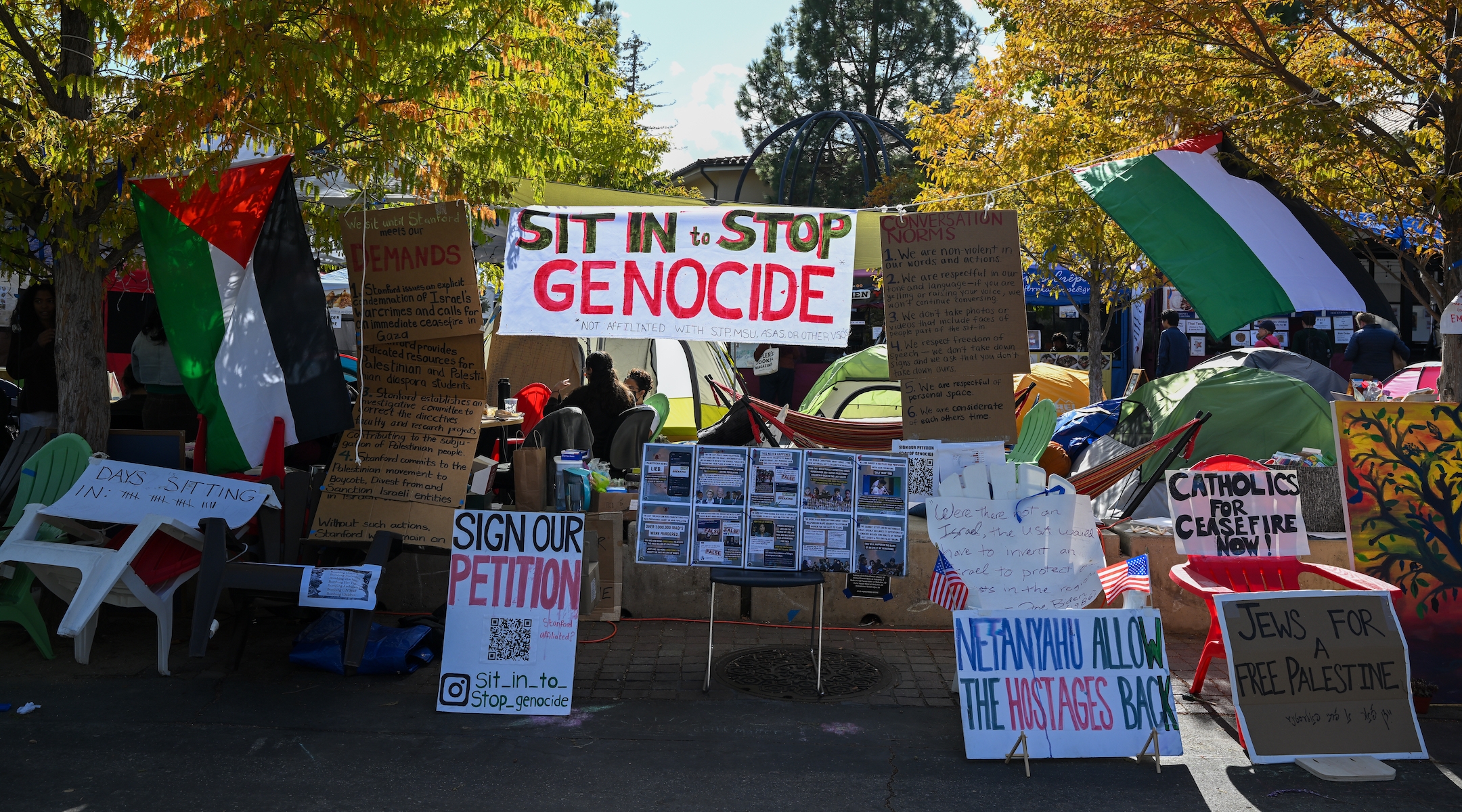Stanford task force documents ‘widespread and pernicious’ antisemitism on campus since Oct. 7
The report is the first major detailed examination of antisemitism at an elite college to be published since the war’s outbreak

Stanford students camp out in front of the university’s White Plaza to push the school to adopt more aggressive stances against Israel, Stanford, California, November 7, 2023. (Tayfun Cokun/Anadolu via Getty Images)
(JTA) — Antisemitism is prevalent at Stanford University and action on several fronts is needed to combat it, a committee charged with analyzing its presence on campus since Oct. 7 has concluded.
“Our Subcommittee has reached a simple but highly disturbing conclusion: there can be no doubt that antisemitism exists today on the Stanford campus in ways that are widespread and pernicious,” says the report, finalized last month and released publicly on Thursday. It is the first major detailed examination of antisemitism at an elite college to be published since the war’s outbreak.
After conducting numerous listening sessions with Jews on campus as well as university officials, the committee is recommending that the school take steps to improve safety and mental health resources for Jewish students, while also shifting its approach to diversity, equity and inclusion, known as DEI, to a more “pluralistic framework” that would more fully encompass Jewish identity. Its 146-page report, titled “It’s In The Air: Antisemitism and Anti-Israel Bias at Stanford and How to Address It,” recounts more than 300 student, staff and faculty experiences since Oct. 7.
“This report makes clear that the crisis of antisemitism on college campuses today is, in part, a symptom of academia’s failure to teach students to both think critically and openly about others’ viewpoints,” Larry Diamond, a Jewish Stanford faculty member and the committee’s co-chair, said in a statement.
The committee was formed in 2022, well before Oct. 7, as the California university reckoned with its history of excluding Jewish applicants. It was repurposed after Hamas’ attack on Israel to examine the experiences of Jewish students on campus amid protests against the ensuing war in Gaza. In December, one of its original co-chairs, a Jewish studies professor, stepped down after coming under attack from pro-Israel alums who claimed his views were too progressive to accurately assess the problem of antisemitism.
The committee, which includes the school’s Hillel director as well as enrolled Jewish students, says that many Jews on campus have felt socially ostracized or “tokenized” as a result of the war, even those who “were well to the left of center in relation to the Israeli political spectrum.” Some experienced direct antisemitism in their classrooms or dorm rooms, including vandalism and graffiti on Jewish students’ doors, while others faced social media pressures to explicitly denounce Israel.
Regardless of what they faced, the committee concluded, Stanford did not offer enough recourse when it came to bias reporting, safety, or the mental health of its Jewish community.
A separate report released Thursday by a different task force, on the experiences of Muslim, Arab and Palestinian students, concluded that they “have felt afraid for their safety, unseen and unheard by university leadership, and silenced through a variety of formal and informal means when they assert the rights and humanity of Palestinians” since Oct. 7. The committee claimed that Stanford has created a free speech “exception” for Palestinians and failed to protect pro-Palestinian students from both their peers, including some Israeli students who reportedly intimidated them, and outside aggressors, including pro-Israel groups like Canary Mission that have used various means to intimidate college students they see as supporting Hamas.
Stanford’s president welcomed the reports and said they demonstrated “areas of attention” for the school’s administration.
“We are committed to a campus climate at Stanford that is welcoming to individuals of all backgrounds, faiths, nationalities, and points of view,” Richard Saller said in a statement thanking the committees. “The painful events of the last several months have made clear that we have much work to do in achieving that aspiration.”
While Stanford’s committee delivered a series of concrete recommendations, including increased antisemitism training for campus leadership and a call to deepen the university’s ties with Hillel, Saller did not provide details of which, if any, would be implemented.
The reports’ release comes amid turmoil connected to antisemitism task forces established at several other elite universities after Oct. 7. At Columbia University, where a final report is expected shortly, three administrators were suspended last week over disparaging text messages sent during a campus panel about the climate for Jewish students.
The antisemitism task forces are officially advisory but have taken on outsized significance and are being watched closely in the wake of Oct. 7, becoming barometers for how colleges have approached their relationships to their Jewish communities as many have become swept up in pro-Palestinian protest movements.
Members of Harvard’s antisemitism task force resigned over their disagreements with the school’s leadership or because they reportedly feared the university would not implement their recommendations. The professor leading that task force has also come under fire from Jewish critics for his views. And Northwestern University’s task force collapsed after the school’s Jewish president, Michael Schill, struck a deal with organizers of the school’s pro-Palestinian encampment, causing its Jewish members to resign en masse.














